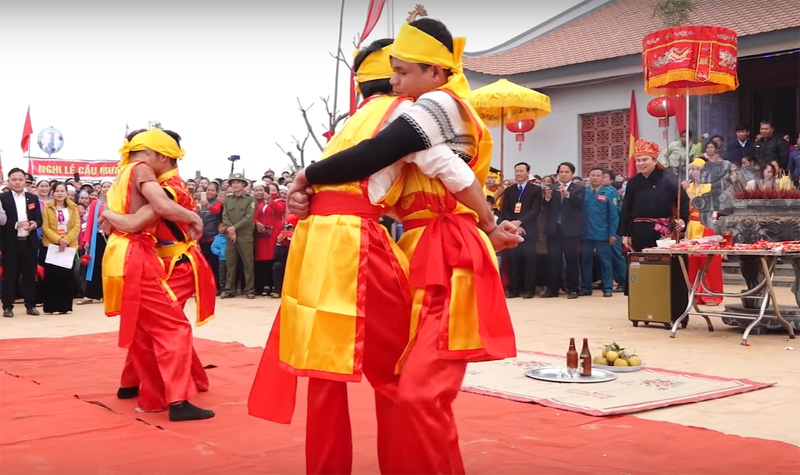
(HBO) - Muong ethnic group’s traditional wrestling is both an unique traditional folk game and a sport for youths. Every New Year when spring comes, Muong traditional wrestling is revived at festivals, apart from fun sports such as crossbow shooting, tug of war, stick pushing and volleyball.
 Muong traditional
wrestling at 2020 Khoi communal house festival in An Nghia commune, Lac Son
district.
Muong traditional
wrestling at 2020 Khoi communal house festival in An Nghia commune, Lac Son
district.
Muong traditional wrestling has existed for
thousands years. In the past, locals competed in wrestling matches, not only
during spring festivals. During the opening of the 2020 Khoi communal house
festival in An Nghia commune, Lac Son dsitrict, the revival of Muong
traditional wrestling was welcomed by the public.
Meritorious Artisan Bui Huy Vong from Huong
Nhuong commune, Lac Son district said traditional wrestling was an official
sport at the district sports festival in 2017. It is not only a folk game but
also a religious ritual during festivals. The game is quite simple, only
requiring a few movements to play. But to play well, experience and techniques
are needed to win rivals. Also according to him, the game is the most popular
in former Lien Vu commune (now Vu Ban township).
In Muong Khenh area, Van Son commune, Lac Son
district, a temple (now already demolished) was dedicated to Chuong Tin and
Trieu An (legend has it that they were generals of Trieu Thi Trinh) – who led
the people against the Wu enemy. According to the legend, apart from training
soldiers in crossbow shooting, they also included Muong wrestling into a
compulsory training session each day for soldiers. Every three years, on the
full moon day of the second lunar month, the Muong people hold a big festival.
Traditional wrestling and crossbow shooting have become religious rituals to
remember Chuong Tin and Trieu An who trained soldiers in the past.
This game is usually held on flat grounds or
clean sandy beaches, without any sticks or gravels to ensure the safety of
wrestlers. Only two opponents join each round. When entering the match, both
must absolutely obey the referee's instructions. The winner will be promoted to
the next round, while the loser will be out of the game.
Muong traditional wrestling is quite diverse in
style and trick, but there are some basic steps such as preparation, also known
as "catching" (hugging), during which the two wrestlers step to face,
with straight back and chest rubbing close together, and then hand out hugging
behind the opponents’ belts on the principle of inside and outside hands. This
step requires straight back naturally, feet placed in parallel with the
opponent's on the principle inside and outside legs. When the two sides do not
break the rules of catching, the referee will order them to compete.Whoever
falls to the ground or is dropped to the ground is defeated. The rules seem to
be simple, but the way to play the game makes it hard for the opponent to use
bad tricks or fraud.
Nowadays, many modern sports have gradually
replaced Muong traditional wrestling. In the coming time, the provincial
Culture, Sports and Tourism Department is expected to pay more attention to
preserving and upholding traditional cultural values of the nation, including
Muong traditional wrestling./.
With an increasingly vibrant and widespread emulation movement aimed at building cultured residential areas and cultured families, Yen Thuy District has been making steady progress toward improving both the material and spiritual well-being of its people, while fostering a civilized, prosperous, beautiful, and progressive community.
Once lacking recreational spaces and community facilities, Residential Group 2 in Quynh Lam Ward (Hoa Binh City) has recently received attention for the construction of a new, spacious, and fully equipped cultural house. The project followed the model of state support combined with public contributions in both labor and funding.
The "All people unite to build cultural life" movement, which has been effectively integrated with Kim Boi district’s socio-economic development goals, is fostering a lively spirit of emulation across local residential areas, hamlets, villages, public agencies, and enterprises. In addition, through the initiative, traditional cultural values are being preserved and promoted, while community solidarity and mutual support in poverty reduction and economic development are being strengthened.
A working delegation of the Hoa Binh provincial People’s Committee led by its Permanent Vice Chairman Nguyen Van Toan on June 11 inspected the progress of a project to build the Mo Muong Cultural Heritage Conservation Space linked to tourism services in Hop Phong commune, Cao Phong district.
Born and growing in the heroic land of Muong Dong, Dinh Thi Kieu Dung, a resident in Bo town of Kim Boi district, in her childhood was nurtured by the sweet lullabies of her grandmother and mother. These melodies deeply imprinted on her soul, becoming an inseparable part of her love for her ethnic group's culture. For over 20 years, this love for her hometown has driven Dung to research, collect, and pass down the cultural values of the Muong people to future generations.
In the final days of May, the Ethnic Art Troupe of Hoa Binh Province organized performances to serve the people in remote, mountainous, and particularly disadvantaged areas within the province. These were not just ordinary artistic shows, but they were the meaningful journeys aimed at spreading cultural values, enhancing the spiritual life of the people and contributing to the preservation of ethnic minority cultural identities.



 Muong traditional
wrestling at 2020 Khoi communal house festival in An Nghia commune, Lac Son
district.
Muong traditional
wrestling at 2020 Khoi communal house festival in An Nghia commune, Lac Son
district.